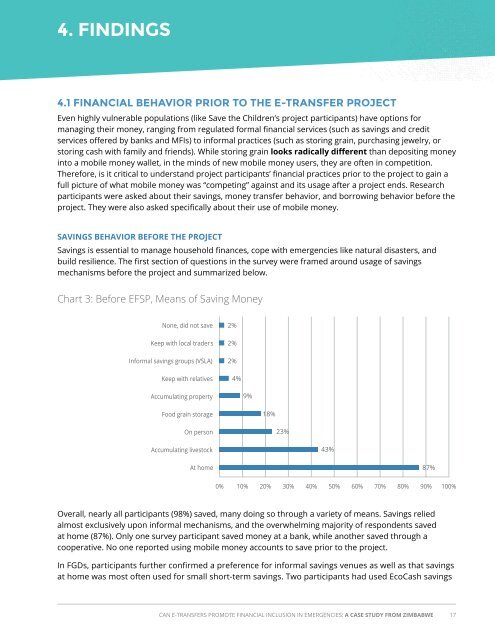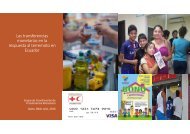Simatelele
2lF850q
2lF850q
Create successful ePaper yourself
Turn your PDF publications into a flip-book with our unique Google optimized e-Paper software.
4. FINDINGS<br />
4.1 FINANCIAL BEHAVIOR PRIOR TO THE E-TRANSFER PROJECT<br />
Even highly vulnerable populations (like Save the Children’s project participants) have options for<br />
managing their money, ranging from regulated formal financial services (such as savings and credit<br />
services offered by banks and MFIs) to informal practices (such as storing grain, purchasing jewelry, or<br />
storing cash with family and friends). While storing grain looks radically different than depositing money<br />
into a mobile money wallet, in the minds of new mobile money users, they are often in competition.<br />
Therefore, is it critical to understand project participants’ financial practices prior to the project to gain a<br />
full picture of what mobile money was “competing” against and its usage after a project ends. Research<br />
participants were asked about their savings, money transfer behavior, and borrowing behavior before the<br />
project. They were also asked specifically about their use of mobile money.<br />
SAVINGS BEHAVIOR BEFORE THE PROJECT<br />
Savings is essential to manage household finances, cope with emergencies like natural disasters, and<br />
build resilience. The first section of questions in the survey were framed around usage of savings<br />
mechanisms before the project and summarized below.<br />
Chart 3: Before EFSP, Means of Saving Money<br />
None, did not save<br />
Keep with local traders<br />
Informal savings groups (VSLA)<br />
Keep with relatives<br />
2%<br />
2%<br />
2%<br />
4%<br />
Accumulating property<br />
9%<br />
Food grain storage<br />
18%<br />
On person<br />
23%<br />
Accumulating livestock<br />
43%<br />
At home<br />
87%<br />
0% 10% 20% 30% 40% 50% 60% 70% 80% 90% 100%<br />
Overall, nearly all participants (98%) saved, many doing so through a variety of means. Savings relied<br />
almost exclusively upon informal mechanisms, and the overwhelming majority of respondents saved<br />
at home (87%). Only one survey participant saved money at a bank, while another saved through a<br />
cooperative. No one reported using mobile money accounts to save prior to the project.<br />
In FGDs, participants further confirmed a preference for informal savings venues as well as that savings<br />
at home was most often used for small short-term savings. Two participants had used EcoCash savings<br />
CAN E-TRANSFERS PROMOTE FINANCIAL INCLUSION IN EMERGENCIES: A CASE STUDY FROM ZIMBABWE 17



